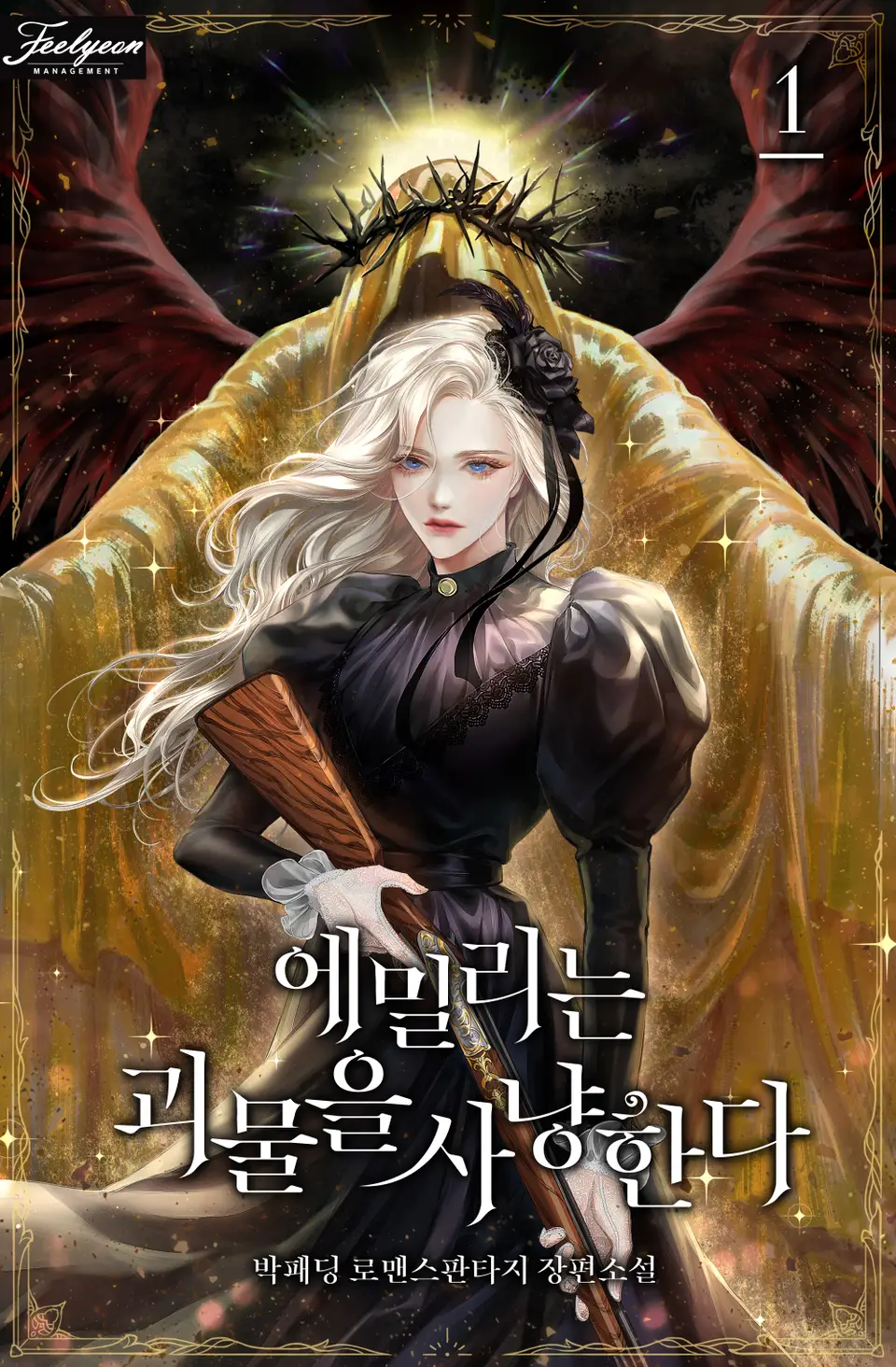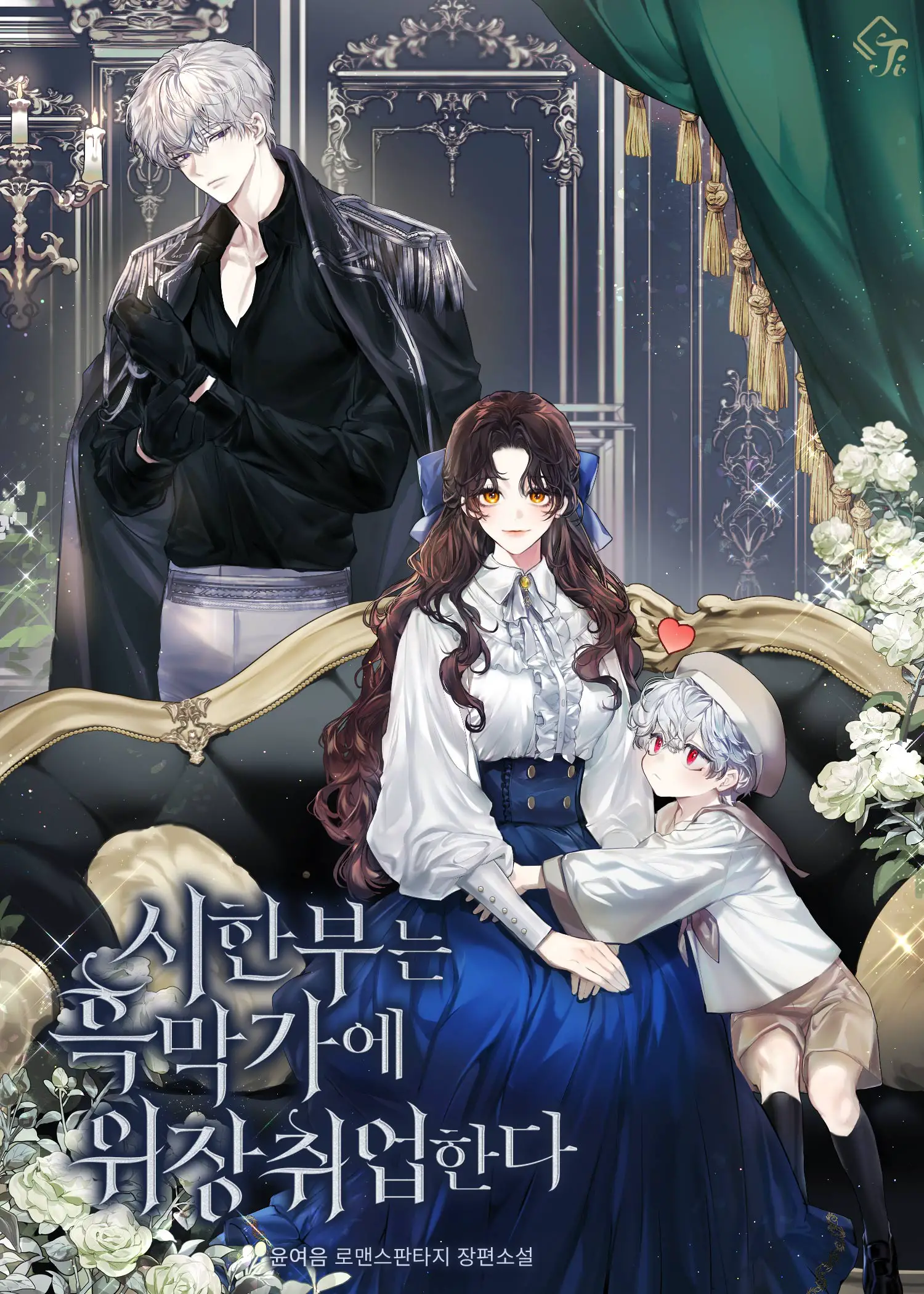If Beatrice had resisted, Francis wouldn’t have been able to drag her away. But at that moment, his expression intrigued her, and she didn’t pull her wrist free.
Though tinged with shock, the emotion in his eyes was unmistakably fear. It wasn’t a fear with a clear target—it was the kind of terror born of the unknown.
Beatrice had never seen Francis make such a face. Not in all the lifetimes she had lived. She couldn’t help but wonder what had caused him to look at her that way.
Could it be that memories of her past lives had resurfaced for him? The thought amused her even as it seemed impossible.
“Sir Vellenoze,” she called, her voice calm.
Francis didn’t reply. He moved quickly, almost running, dragging her along with him. Beatrice’s dress trailed behind her, billowing like a mirage. Laura, who had lost her grip on him, called out after them.
“Sir!”
Beatrice called again, her voice steady.
“Francis.”
When there was no response, Beatrice called his name again, but this time she stopped walking, halting their progress.
Her firm grip on his wrist brought Francis to a sudden stop. Taking advantage of his stillness, Beatrice grabbed his shoulder, turned him around, and raised her hand. Without hesitation, her palm struck his cheek.
Smack. The sound echoed down the hallway, loud enough to make anyone wince. His head snapped to the side, and a vivid red mark began to bloom on his cheek. She paid no mind, freeing her wrist from his grip and raising her hand once more.
“Another slap?”
“N-No! I’ve come to my senses. Yes!”
“Good. Sir Vellenoze, I don’t know what’s going on, but you owe me an explanation. Dragging me off like that without a word?”
“She’s right!”
Laura, who had been running after them, added breathlessly. Though she hadn’t hit him hard, it seemed Francis had bitten the inside of his cheek; his lips moved as though he were checking for a wound. Beatrice merely observed, unimpressed.
“Whatever the reason, we’ll hear it in my room,” Beatrice declared, turning sharply.
Francis nodded slowly, his face filled with remorse.
The three of them returned to Beatrice’s room, where Laura quickly tasked other servants with tidying the garden and brought in fresh tea. Notably, none was prepared for Francis.
Sitting in her room, Francis silently lamented his rash actions. The hallucination had been overwhelming. Could something look so vivid, so real? It had felt like an actual event.
He rubbed his face with his hands, trying to compose himself. His sharp, cold features made it easy to hide his emotions, but he didn’t realize that such tactics wouldn’t work on Beatrice.
“Now, explain yourself,” Beatrice said, her voice calm but firm.
“I sensed a sudden and inexplicable presence,” he replied, grasping for a plausible lie. “I judged the situation to be dangerous and acted accordingly. I admit I was startled, and I apologize for my lack of decorum.”
Francis lied, drawing on the vague explanations he had previously coordinated with the priest Theodor. He couldn’t explain his inexplicable ability, so he settled for a fabricated excuse.
Beatrice listened, sipping her tea in silence. Francis believed that her usual detachment and disinterest in others would keep her from questioning him further. But her next words struck him like a dagger.
“So that’s why you were so terrified,” she said.
“Excuse me?”
“You looked as if you’d seen something truly frightening. What did you see?”
Despite Francis’s claim of sensing an unusual presence, Beatrice asked directly what he had seen. Cold sweat trickled down his back.
“I… saw nothing,” he stammered.
“Liar.”
With a deliberate clink, Beatrice set her teacup down. Did he think she was too much of a fool to discern the truth?
She was certain Francis had seen something through her. His gaze had been too fixed, too piercing—not on her, but beyond her, as if looking through a mirror to another world.
Tilting her head habitually, Beatrice felt her hair slide off her shoulder. Though she didn’t know Francis well, she had witnessed him once in the past—when he had driven her to her death.
Francis exhaled heavily, a sound that was somewhere between a sigh and a release of pent-up breath.
“I’m not lying,” he insisted. “I was merely overwhelmed by an unusual presence. The ducal knights should be alerted immediately—it’s dangerous.”
“I told you not to lie,” Beatrice said bluntly.
She had studied dark magic in the past. It was a type of sorcery that borrowed power from inhuman sources, making it harder to detect than ordinary magic.
If she couldn’t sense anything unusual, there was no way Francis could.
Francis, flustered by Beatrice’s probing, began to wonder if she could sense magic or divine energy. He had never been told such a thing. Judging by Theodor and the household’s behavior, she didn’t seem like someone who dealt with magic. Yet her confidence baffled him.
“I don’t understand why you think I’m lying,” he protested. “I truly—”
“Francis,” Beatrice interrupted.
Her tone wasn’t soft, but neither was it cold. It was a smooth, emotionless voice, devoid of inflection, yet it carried a weight he couldn’t resist.
The faint light filtering through the curtains cast a shadow over her face, painting her skin a grayish hue. Even beneath the shadow, her yellow eyes glinted sharply, appearing almost harsh.
“What are you so afraid of?”
Beatrice gestured for him to approach. It was an unassuming motion, but Francis felt an undeniable pressure. Compelled, he moved closer, almost against his will.
What a strange woman, he thought.
In the short time he had been by her side, he had noticed peculiarities. Unlike others whose presence drew attention, hers was fleeting, almost nonexistent when not directly facing her.
She never seemed bored, even when idling for hours, and her calm demeanor in unsettling situations was unnerving. She wasn’t angry now—just gesturing silently, her face unreadable.
And yet, that simple gesture left no room for lies.
Beatrice glanced at Laura, signaling her silently. Though she looked displeased, Laura dutifully stepped outside. No doubt she would wait right by the door, ready to barge in if anything happened.
Once alone, Beatrice took Francis’s hand.
His hand flinched slightly at the contact. Though Beatrice’s hands were on the cooler side, his were even colder, and his fingertips were almost white.
Was he truly that frightened? She ran her fingers over the joints in his hand, idly musing. His hand twitched each time her fingers brushed against it, but she didn’t pay it any mind.
“I know that Priest Theodor has been lying to me,” she said calmly.
“You… already knew?”
“Yes.”
Beatrice’s brief response left Francis certain that she could sense magic. Moreover, it was clear that no one else knew this about her.
Since she had shared a secret with him, Francis felt a sense of obligation to do the same. He wasn’t sure why she was keeping this hidden, but it wasn’t his place to pry.
“Why didn’t you say anything before now?” he asked.
“I never saw the need. None of you would harm me.”
Or rather, they ‘couldn’t’ harm her, not even if they tried.
Beatrice still held his hand, her grip gentle enough that he could easily pull away if he wanted. Yet, he chose not to.
“The power used in dark magic is notoriously difficult to detect,” he said.
“It’s tricky, yes, but not impossible,” Beatrice replied.
Francis furrowed his brow. The source of dark magic’s power was unknown, but it operated on principles vastly different from human magic, making it hard to perceive even for the imperial court magicians.
That was why priests relied on artifacts imbued with divine power to detect it. These artifacts were less like magic detectors and more akin to impurity sensors, designed to locate untraceable power.
Yet Beatrice seemed to claim she could sense such power with ease. While rare, some mages had heightened sensitivity to magical energies, but even among the imperial court magicians, such individuals were unheard of.
“Can you use magic?” he asked cautiously.
“No.”
Beatrice wasn’t lying; she simply never felt the need to use magic. Chanting spells and reciting formulas seemed unnecessary when breaking a neck with her bare hands was quicker.
Francis interpreted her response as a denial of magical ability and fell into thought. A person highly attuned to magical forces but unable to wield magic—uncommon, but not impossible.
At the magic academy, such individuals were typically expelled, their cases surfacing once or twice every decade.
“Does the duchy know about this?”
“No.”
Beatrice pulled his hand slightly closer.
“Which means it’s your turn to share a secret now.”
“My secret is far heavier than yours, my lady,” Francis replied cautiously.
“Is it? Then just tell me. The Duchess told me that rank exists for times like this.”
“…The Duchess said that?”
“She’s a wise woman.”
Though his frown deepened, Francis didn’t withdraw his hand. Besides his parents, only two people knew about his ability: Priest Theodor and his childhood friend, Vicellophe.
Both had advised him to keep it a closely guarded secret.
Francis’s ability—perceiving omens of misfortune—was a power ripe for exploitation, both politically and personally.
He met Beatrice’s gaze. Her eyes, devoid of malice or emotion, offered no clue as to how she might react to his revelation. Still, there was a reason to tell her.
He had seen two vivid hallucinations of her, recognized her awareness of Theodor’s lies, and found her calm demeanor unsettling. And, perhaps, there was something about the faint connection of their clasped hands.
“Francis.”
Her voice, speaking his name so naturally as though it always had, disrupted his train of thought. Truly, she was an odd woman.
In the end, Francis confessed. He explained his ability, why he had cooperated with Theodor’s lies, and the danger he feared might befall her. He even described the two visions he had experienced.
Beatrice listened in silence until he finished. She neither questioned nor doubted his words; she simply listened.
“You may find it hard to believe, but—”
“I believe you.”
Beatrice’s simple reply stunned him.
Why wouldn’t she? Though his ability was a revelation, her countless lifetimes had taught her that the world held many such secrets. It was plausible that the Francis from her previous lives had possessed this ability too.
Was it a coincidence that he saw such vivid visions of her past? Or had this power always been with him?
Francis considered her immediate acceptance strange. Was she naïve?
She was aloof, seemingly disinterested in the world, but she had lived within the duchy her entire life. Perhaps her isolation had left her gullible.
“Regardless, you must remain vigilant, my lady. We cannot predict what might happen.”
“You needn’t worry,” Beatrice said, her voice steady.
“What?”
“Nothing will happen.”
Francis opened his mouth to protest, but her unwavering expression silenced him. Her certainty was unsettling, as if she knew something he didn’t.
Beatrice released his hand, and the loss of her faint warmth left Francis feeling inexplicably bereft. Without realizing why, he missed her casual tone and the way she had addressed him by name.
Beatrice spoke again, her tone formal and detached.
“I understand your concerns, Sir Vellenoze. But rest assured, nothing will happen to me.”
Though he wanted to question her confidence, Francis refrained. Her stance was clear, and no further discussion would be permitted.
Returning to his post, he called Laura back into the room before taking up his position outside the door.
Laura didn’t ask about their conversation. Instead, she stood silently behind Beatrice, who was deep in thought.
Beatrice didn’t know everything about Francis’s visions, but she understood enough. For instance, the noble who always died in a carriage accident in her previous lives—that was a constant.
“What could it mean?”
Francis wasn’t sensing future dangers or omens. He was glimpsing the past—specifically, her past.
The visions of those who hadn’t died yet were of people whose deaths she had caused. If she didn’t kill them, they wouldn’t die.
It was ironic. The lives she had repeated alone had left a mark on him as well.
“Who are you, Francis,” she mused, a faint smile curling her lips.
“Who are you, to be peering into my past?”
* * *
As Beatrice predicted, two weeks passed without incident. The suspect in the Count’s murder remained at large, but rumors circulated that those who used dark magic to enhance their bodies rarely lived long. Many speculated the culprit might have died somewhere.
On the fourteenth day, Priest Theodor visited the duchy and performed a convincing act of dispelling a supposed curse. His performance was enthusiastic, almost theatrical.
Beatrice, fully aware of the truth, remained impassive, watching with mild disinterest. Francis, on the other hand, struggled to hide his embarrassment. Still, Beatrice didn’t stop the priest—it was a necessary charade to reassure the ducal household.
Francis, however, viewed Beatrice’s calm demeanor as distasteful, as if she were amused by forcing his revered priest to engage in useless theatrics.
Once the performance concluded, Francis prepared to return to the temple with Theodor. But before departing, Francis intercepted Theodor after his meeting with Agatha, leading him to a quiet corner where no one else could overhear.
“Priest, I have something to discuss,” Francis began.
“Did something happen in my absence?”
Francis nodded and explained everything—except Beatrice’s ability to sense magic. He recounted how she had seen through his lies, how he had confessed his ability and visions, and how he had warned her.
Theodor listened with a serious expression, eventually asking, “Was it wise to reveal your ability to her?”
“I believe so. She believed me, and I don’t think she’s the type to share it with anyone.”
“That’s a relief,” Theodor replied, visibly relaxing.
“Still, there’s something troubling me,” Francis admitted.
“What is it?”
“When I warned her about the visions, she said, with complete certainty, that nothing would happen.”
“Nothing would happen?”
Theodor’s face briefly betrayed something—hesitation, or perhaps doubt. Despite his role as a priest, his expressions were far from inscrutable.
“Yes, she was utterly confident, though I can’t say why.”
Theodor fell silent, clearly deliberating whether to share what he knew. Francis, respecting his hesitation, waited patiently, trusting that the priest would speak if it was something he needed to know.
After some time, Theodor spoke cautiously. “When you first told me about the visions, I considered two possibilities.”
“And they were?”
“One: the lady was in danger we couldn’t yet perceive. The other…”
Theodor paused, licking his dry lips.
“…was that she might take her own life.”
Francis froze, convinced he had misheard. Suicide? The thought had never crossed his mind. Why would she do such a thing?
He thought of her composed demeanor, her dry tone, the tepid warmth of her hand when she had touched his, and the calm way she had spoken his name. None of it matched the image of someone contemplating suicide.
Still, Theodor’s somber voice pressed on, offering no allowance for Francis’s disbelief.
“Lady Beatrice has long dreamt of death,” Theodor said.
The priest’s explanation sounded surreal. It didn’t align with the Beatrice Francis knew—stoic, detached, but seemingly firm in her existence.
He described how she had once sat barefoot under a tree in the freezing winter, how servants had tormented her, and how she had once taken Theodor’s hand and begged him to end her suffering without pain.
It didn’t fit her at all.
“So when you told her about your visions, it might have been enough to dissuade her,” Theodor concluded.
Francis’s expression shifted between shock and confusion. Sensing this, Theodor spoke gently, as if to console him.
“Your words may have stopped her, Francis. Be at peace with that.”
The priest wore a bittersweet expression. Francis blinked and took a few steps back.
“Francis?”
“Priest, please return to the temple without me.”
“What? Where are you going?”
Theodor asked, puzzled, but Francis turned abruptly and walked away at a brisk pace. The priest called after him, but Francis didn’t look back.
He had seen many visions in his time—of murders, accidents, and illnesses—but never suicide. No one he had seen had chosen to bring their death upon themselves.
Rushing through the corridors, he thought of Beatrice. Could his words really have made her change her mind? He told himself his actions were driven by duty, but deep down, he knew there was more to it.
💜 Thank You for Your Support! 💜

Your support helps me keep wanting to update more! ☕💖




